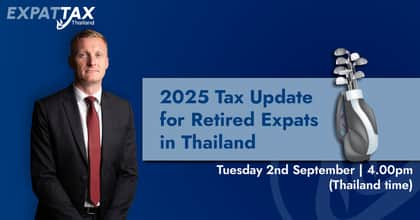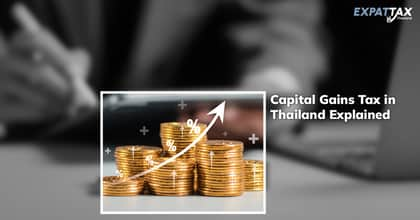เมื่อวันที่ 7 กรกฎาคม พ.ศ. 2568 ประธานาธิบดีโดนัลด์ ทรัมป์ ของสหรัฐอเมริกาได้ประกาศจัดเก็บภาษีนำเข้าสินค้าทุกประเภทจากประเทศไทยในอัตรา 36% โดยจะมีผลบังคับใช้ตั้งแต่วันที่ 1 สิงหาคม พ.ศ. 2568 เป็นต้นไป เว้นแต่จะมีการบรรลุข้อตกลงทางการค้า มาตรการนี้ซึ่งมีจุดมุ่งหมายเพื่อแก้ไขปัญหาการขาดดุลการค้าระหว่างสหรัฐฯ กับประเทศไทย อาจส่งผลกระทบอย่างรุนแรงไม่เพียงแต่ต่อเศรษฐกิจของไทยเท่านั้น แต่ยังรวมถึงชาวต่างชาติที่อาศัยอยู่ในประเทศไทยด้วย
นี่คือสิ่งที่คุณจำเป็นต้องรู้และผลกระทบต่อชีวิตประจำวันของคุณ
ภูมิหลังความสัมพันธ์การค้าระหว่างสหรัฐอเมริกาและไทย
ไทยยังคงเป็นคู่ค้าสำคัญของสหรัฐอเมริกา โดยส่งออกสินค้ามูลค่าประมาณ 1.92 ล้านล้านบาท (ประมาณ 1.655 หมื่นล้านดอลลาร์สหรัฐ) ในปี 2567 ซึ่งรวมถึงอาหารสัตว์เลี้ยง อุปกรณ์อิเล็กทรอนิกส์ และสิ่งทอ การตัดสินใจของสหรัฐฯ ที่จะจัดเก็บภาษีศุลกากรมีเป้าหมายเพื่อแก้ไขปัญหาความไม่สมดุลทางการค้าที่รับรู้โดยการส่งเสริมให้ไทยนำเข้าสินค้าจากสหรัฐฯ มากขึ้น ในทางกลับกัน ไทยได้ตอบโต้ด้วยข้อเสนอที่จะลดภาษีศุลกากรสินค้าจากสหรัฐฯ หลายรายการลงเป็นศูนย์ รวมถึงเนื้อวัวและสุรา โดยมุ่งหวังที่จะแก้ไขปัญหานี้ก่อนเส้นตายการเจรจาที่สำคัญในวันที่ 9 กรกฎาคม
สิ่งนี้หมายถึงอะไรสำหรับเศรษฐกิจของประเทศไทย?
ผลกระทบต่อเศรษฐกิจของประเทศไทยอาจร้ายแรงได้ดังนี้:
- การหดตัวของ GDPนักวิเคราะห์เศรษฐกิจคาดการณ์ว่าเศรษฐกิจอาจหดตัวที่ 1.1% ซึ่งอาจทำให้การใช้จ่ายของผู้บริโภคลดลง และอาจนำไปสู่การสูญเสียตำแหน่งงานได้
- ความท้าทายในการส่งออก:สินค้าส่งออกสำคัญของไทย เช่น อาหารสัตว์เลี้ยง อุปกรณ์อิเล็กทรอนิกส์ และสิ่งทอ อาจสูญเสียความสามารถในการแข่งขันในตลาดสหรัฐฯ
- การกระจายการค้า:ประเทศไทยอาจตอบสนองโดยการเปลี่ยนจุดเน้นการค้าไปที่ประเทศอาเซียนหรือจีน ซึ่งอาจเปลี่ยนแปลงห่วงโซ่อุปทานและพลวัตทางเศรษฐกิจได้อย่างมีนัยสำคัญ
ผลกระทบต่อชาวต่างชาติในประเทศไทย
สำหรับชาวต่างชาติ ภาษีเหล่านี้สามารถรู้สึกได้ในหลายลักษณะสำคัญ:
ต้นทุนสินค้าสหรัฐฯ ที่สูงขึ้น
ไทยมีภาษีนำเข้าสินค้าจากสหรัฐฯ สูงอยู่แล้วหลายรายการ:
- เนื้อวัว: 51%
- ผลิตภัณฑ์นม: 30%
- สุรา: ภาษีรวมสูงสุด 400%
- อิเล็กทรอนิกส์: ปัจจุบันอยู่ในระดับต่ำ แต่มีความเสี่ยงที่จะเพิ่มขึ้น
หากมีการนำภาษีตอบโต้มาใช้ สินค้าเหล่านี้อาจมีราคาแพงยิ่งขึ้น ส่งผลให้ผู้ที่อาศัยอยู่ในต่างแดนมองหาทางเลือกอื่นในพื้นที่หรือภูมิภาค
ภาวะเศรษฐกิจชะลอตัวและตลาดงาน
เศรษฐกิจที่ชะลอตัวอาจส่งผลกระทบต่อการจ้างงานในอุตสาหกรรมที่ต้องพึ่งพาการค้าระหว่างประเทศ การผลิต และการท่องเที่ยว ซึ่งเป็นพื้นที่ที่ชาวต่างชาติจำนวนมากหางานทำ เจ้าของธุรกิจในชุมชนชาวต่างชาติอาจประสบปัญหาอุปสงค์ลดลง ต้นทุนการดำเนินงานสูงขึ้น และห่วงโซ่อุปทานหยุดชะงัก
ความผันผวนของสกุลเงิน
ความตึงเครียดทางการค้ามักนำไปสู่ความผันผวนของค่าเงิน ค่าเงินบาทที่อ่อนค่าลงจะส่งผลดีต่อชาวต่างชาติที่มีรายได้เป็นเงินตราต่างประเทศ แต่ผู้ที่พึ่งพารายได้ภายในประเทศอาจต้องเผชิญกับต้นทุนการนำเข้าที่สูงขึ้นและความไม่มั่นคงทางการเงิน
ความไม่แน่นอนทางธุรกิจและการลงทุน
ชาวต่างชาติที่ทำธุรกิจหรือลงทุนในอสังหาริมทรัพย์ในประเทศไทยอาจเผชิญกับความท้าทายที่เพิ่มมากขึ้น ตั้งแต่การหาเงินทุนไปจนถึงการรักษามูลค่าทรัพย์สินและรายได้จากการเช่าให้คงที่
ผลกระทบต่อการท่องเที่ยวและชุมชน
ภาคการท่องเที่ยวของประเทศไทยอาจได้รับผลกระทบจากเสถียรภาพทางเศรษฐกิจที่ลดลง ซึ่งอาจทำให้บริการและสิ่งอำนวยความสะดวกที่สำคัญสำหรับชุมชนชาวต่างชาติ เช่น โรงเรียนนานาชาติและการดูแลสุขภาพ ลดน้อยลง
ปัจจัยที่อาจช่วยบรรเทาผลกระทบได้
ยังคงมีโอกาสสำคัญที่จะหาข้อยุติหรือลดผลกระทบผ่านการเจรจาที่กำลังดำเนินอยู่ ความเต็มใจของไทยที่จะยกเลิกภาษีศุลกากรสำหรับสินค้าต่างๆ ของสหรัฐฯ อาจเอื้อให้เกิดการประนีประนอม ซึ่งอาจเป็นประโยชน์ต่อชาวต่างชาติ เนื่องจากทำให้สินค้าของสหรัฐฯ มีราคาถูกลง นอกจากนี้ การที่ไทยแสวงหาตลาดทางเลือกอย่างแข็งขันและการให้ความสำคัญกับการผลิตในประเทศมากขึ้น อาจช่วยบรรเทาผลกระทบทางเศรษฐกิจได้
โอกาสในการแก้ไขปัญหา
แม้ว่าผลลัพธ์จะยังคงไม่แน่นอน แต่ปัจจัยหลายประการบ่งชี้ว่ามีโอกาสที่สมเหตุสมผลที่จะหาข้อยุติได้ แนวทางเชิงรุกของไทยในการเจรจา โดยเสนอการลดภาษีสินค้าจากสหรัฐฯ อย่างมีนัยสำคัญ แสดงให้เห็นถึงความเต็มใจอย่างยิ่งที่จะหาทางประนีประนอม
ผลประโยชน์ทางเศรษฐกิจร่วมกันในการรักษาความสัมพันธ์ทางการค้าที่ดียังเป็นแรงผลักดันให้ทั้งสองประเทศแสวงหาจุดร่วม ขณะที่การเจรจาดำเนินไป ผู้เชี่ยวชาญยังคงมองโลกในแง่ดีอย่างระมัดระวังว่าจะสามารถบรรลุข้อตกลงที่เป็นประโยชน์ได้
คำแนะนำที่เป็นประโยชน์สำหรับชาวต่างชาติ
เพื่อเตรียมพร้อมรับมือกับการเปลี่ยนแปลงที่อาจเกิดขึ้น ผู้ที่อาศัยอยู่ต่างแดนควร:
- ติดตามข้อมูลตรวจสอบแหล่งข่าวที่เชื่อถือได้และฟอรัมของผู้ที่อาศัยอยู่ต่างแดนเพื่อรับข้อมูลอัปเดตเป็นประจำ
- เลือกผลิตภัณฑ์ในท้องถิ่น:หันมาผลิตสินค้าไทยหรืออาเซียนแทน เพื่อเลี่ยงราคาที่พุ่งสูง
- กระจายกลยุทธ์ทางการเงิน:เตรียมพร้อมรับมือกับความผันผวนของสกุลเงินและพิจารณาคำแนะนำทางการเงินเพื่อจัดการกับการเปลี่ยนแปลงอย่างมีประสิทธิภาพ
- สำรวจตลาดทางเลือก:หากคุณเป็นเจ้าของธุรกิจ ให้กระจายซัพพลายเออร์และตลาดของคุณเพื่อลดการพึ่งพาสินค้าจากสหรัฐอเมริกา
- มีส่วนร่วมกับเครือข่ายชุมชน:เชื่อมต่อกับผู้ที่อาศัยอยู่ต่างแดนคนอื่นๆ เพื่อแบ่งปันทรัพยากร กลยุทธ์ และข้อมูลในการนำทางการเปลี่ยนแปลงเหล่านี้
ความคิดสุดท้าย
เนื่องจากใกล้ถึงกำหนดเส้นตายภาษีศุลกากร การรับทราบข้อมูลและการดำเนินการเชิงรุกจึงเป็นสิ่งสำคัญสำหรับชาวต่างชาติที่อาศัยอยู่ในประเทศไทย แม้ว่าจะมีความท้าทายอยู่บ้าง แต่เศรษฐกิจที่เติบโตอย่างมีพลวัตและการสนับสนุนจากชุมชนที่แข็งแกร่งของประเทศไทย จะเป็นหนทางสู่การปรับตัวเข้ากับภูมิทัศน์ทางเศรษฐกิจใหม่ได้อย่างมีประสิทธิภาพ
ติดตามข่าวสารล่าสุด
ต้องการรับข้อมูลอัปเดตเกี่ยวกับข่าวสารภาษีล่าสุดสำหรับชาวต่างชาติหรือไม่? ลงทะเบียนเพื่อรับการแจ้งเตือนภาษีฟรีและรับการอัปเดตที่ชัดเจนส่งตรงไปยังกล่องจดหมายของคุณ


